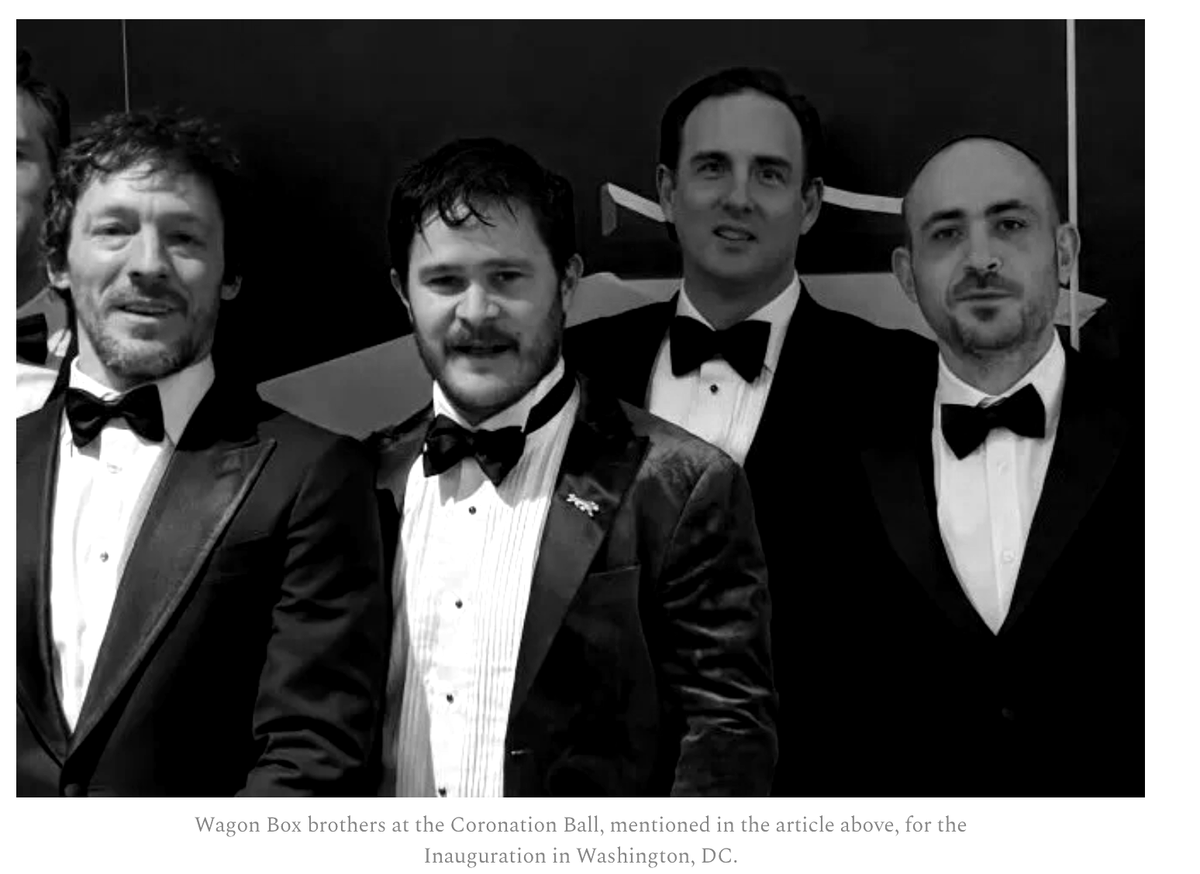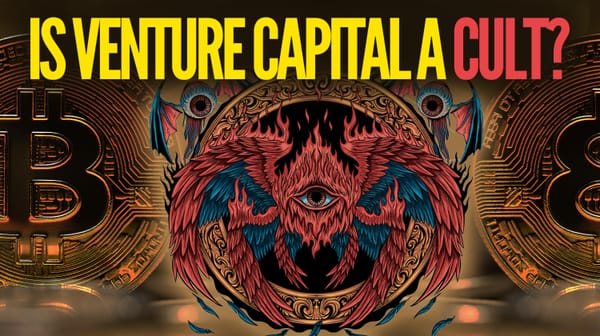Is a Network State Project Taking Root in Wyoming?
Also: Network State mentioned in New York Times — kinda

Is a Network State project taking root in Wyoming?
For the Guardian, Jason Wilson and Ali Winston report on Wagon Box, a so-called “decentralized autonomous organization” near Story, Wyoming, that’s attracting the “dissident right,” tech reactionaries — and even mainstream journalists like James Pogue.
Wagon Box claims to be inspired by Balaji Srinivasan’s vision of a post-United States world made up of network states. (Click below to read the story)

From the story:
A vacation lodge known as the Wagon Box Inn in the tiny town of Story, Wyoming, has emerged as an unlikely hub of rightwing ambitions to reorient US politics and culture.
Events held there since it opened, and others planned for this spring, have brought together figures from the so-called “dissident right”, political figures backed by reactionary currents in Silicon Valley, and proponents of the “network state” movement.
One of the most striking revelations in the story: James Pogue, a journalist who has chronicled the rise of the “New Right,” appears to have a close association with Wagon Box:
The schedule for a Wagon Box event last August promised a conversation between [Jonathan] Keeperman and the journalist James Pogue on “the failure of liberalism and globalization”.
Pogue has written extensively about the new right for media outlets including the New York Times and Vanity Fair.
In a post at the Wagon Box’s Substack newsletter, Pogue and McNiel are pictured together in a photograph purportedly taken inside the Passage-Press-sponsored Coronation Ball in Washington this January, and described in a caption as “Wagon Box brothers”.
Passage Press publishes reactionary fascist Curtis Yarvin, whose ideas for destroying the federal government and replacing the president with a king/dictator have become major influences on the Trump administration. Tickets to the Coronation Ball cost between $5,000 and $20,000, according to the event’s website.
I have cited Pogue’s work multiple times. His writing for Vanity Fair was very informative as I started digging into tech fascism. Yet, as these forces have become ascendant in US politics, his pieces have been few and far between. This should really be his moment — he was ahead of the curve — but he seems unusually low-key for a guy who writes for two major American publications.
Has he gotten too close to his subject? His tuxedoed appearance with the Wagon Box crew at the Coronation Ball raises questions. In addition, a website for the Wagon Box Club — a fraternity for adult males that bills itself as the “fraternal order of the Wagon” — features a photo of Pogue strumming a guitar. Did he join a right-wing fraternity with Network State aspirations?
In 2023, Pogue wrote a Vanity Fair piece headlined “Inside the Dissident Fringe, Where the New Right Meets the Far Left, and Everyone’s Bracing for Apocalypse.” It examined how “doomers” and “preppers” were flocking to the American West in an effort to “exit” society:
Tech executives and crypto investors are creating secretive groups to help people “exit”—a term that has taken on almost mystical significance in some circles recently—from our liberal society, tech-dominated lives, and fraying system. And there are grander plans, for whole secessionist movements using crypto and decentralized autonomous organizations to build whole mini societies, many on the model of what Balaji Srinivasan, the former partner at Andreessen Horowitz, calls a “Network State.”
Now he seems very wrapped up with some of those folks.
Pogue also has close ties to Vice President JD Vance. Like Vance, Pogue is from Cincinnati. In 2021, Pogue wrote in The American Conservative that Vance once lived in the house where Pogue had his first beer and his first kiss. These are interesting hometown coincidences, but Pogue recently hinted at a deeper connection with the VP.
During a January interview with Ezra Klein of the New York Times, Pogue said something quite odd:
After JD got the nomination, I had to take a step back. Because I had seen him right before, just privately. And I had this fear of becoming JD Vance’s amanuensis as he rises. [Laughs.]
So I didn’t watch the Republican National Convention. I just couldn’t watch him accept the nomination. I felt too strange, and I felt too wrapped up in it. And I thought it would be better for my reporting to just watch football replays.
Huh? Most journalists with this kind of access and close knowledge would be racing to explain Vance’s rise to their readers. Instead, Pogue chose to watch football out of fear of becoming Vance’s “amanuensis,” which the Merriam-Webster dictionary defines as “one employed to write from dictation or to copy manuscript.”
That is a very weird thing for a journalist to say.
Over on BlueSky, researcher and journalist Hannah Gais had some thoughts:
Personally, I find it a bit weird that James Pogue, who has marketed himself as a lefty reporter on the right, is doing panels with the very subjects he’s reporting on who then describe him as a “brother.” Doesn’t seem that honest to me!
Jonathan Keeperman, who tweets as “L0mez,” sells reactionary books that I sometimes wonder if he’s read (he seems to spend a lot of time online) and has posted about how the government needs to “lamppost the journos.”
But for some reason he’s fine with Pogue?
I’ve gone to a lot of right-wing events, but no one has ever thought it’s a great idea to take a photo with me and call me “sister.” Weird! Wonder what’s different here?
Besides Pogue, Wagon Box has drawn another character who is familiar to longtime Nerd Reich readers. Seneca Scott, a well-known Oakland political agitator. Here is what I wrote about Scott last year:
Scott, the self-styled leader of the campaign to recall Oakland’s mayor, has a history of making anti-LGBTQ and anti-trans statements. He has expressed support for imposing "soft martial law" in Oakland and has posted menacing photos of himself wearing a mas2 and displaying guns with high-capacity magazines. In 2021, he was arrested for carrying a concealed weapon and brandishing a gun.
From the Guardian:
Pogue also appeared alongside Scott at his community garden in a 2023 event hosted by a Scott-run non-profit, Neighbors Together Oakland, that was shuttered by California’s attorney general last year for conducting fundraising without a non-profit license.
I am not sure what is going on with Pogue, whose early writings I found quite informative. The headline of his seminal 2022 Vanity Fair piece — “Inside the New Right, Where Peter Thiel is Placing His Biggest Bets” — hits a bit different after reading the Guardian story. Perhaps he has gone inside to write a book? Hopefully. If not, then he seems to have developed cozy relationships that raise important questions about objectivity and transparency. (In January, Pogue announced he was writing a book about Northern California.)
Pogue declined to speak to the Guardian on the record about his involvement with Wagon Box. But for a journalist wary of becoming an “amanuensis,” he seemed awfully comfortable at the “coronation.”
Historical Note: A reader points out that the Wagon Box Fight was a major battle between US soldiers and the Lakota Sioux in 1867. From Wikipedia:
The Wagon Box Fight was an engagement which occurred on August 2, 1867, in the vicinity of Fort Phil Kearny during Red Cloud's War. A party of twenty-six U.S. Army soldiers and six civilians were attacked by several hundred Lakota Sioux warriors. Although outnumbered, the soldiers were armed with newly supplied breech-loading Springfield Model 1866 rifles and lever-action Henry rifles, and had a defensive wall of wagon boxes to protect them.
Network State mentioned in New York Times — kinda
The creator of the hit HBO Succession has a new movie coming out — and it has a Network State angle.
From NYT columnist's Michelle Goldberg's latest piece, “From the Creator of ‘Succession,’ a Delicious Satire of the Tech Right”:
In November, when the “Succession” creator Jesse Armstrong got the idea for his caustic new movie, “Mountainhead,” he knew he wanted to do it fast. He wrote the script, about grandiose, nihilistic tech oligarchs holed up in a mountain mansion in Utah, in January and February, as a very similar set of oligarchs was coalescing behind Donald Trump’s inauguration.
The film, a scathing satire, premieres next Saturday on HBO — and I can't wait:
As the planet melts down, they start fantasizing about taking over “a couple of failing nations” and running them like start-ups. “We intellectually and financially back a rolling swap-out to crypto network states, populations love it, and it snowballs,” says Randall. But as the global crisis spirals and the dread specter of regulation appears, their ambitions expand. The group seems to have a good relationship with the unnamed president, but they also regard him as an idiot. After the president chastises Venis, they start thinking about replacing him. Given the administration’s “wobbles,” Venis asks, “do we just get upstream, leverage our hardware, software, data, scale this up and coup out the U.S.?”
Whether in remote Wyoming lodges or prestige TV scripts, the Network State vision is creeping from fringe manifesto to cultural touchstone.
“Mountainhead” premieres next Saturday on HBO. Here's the official preview:






